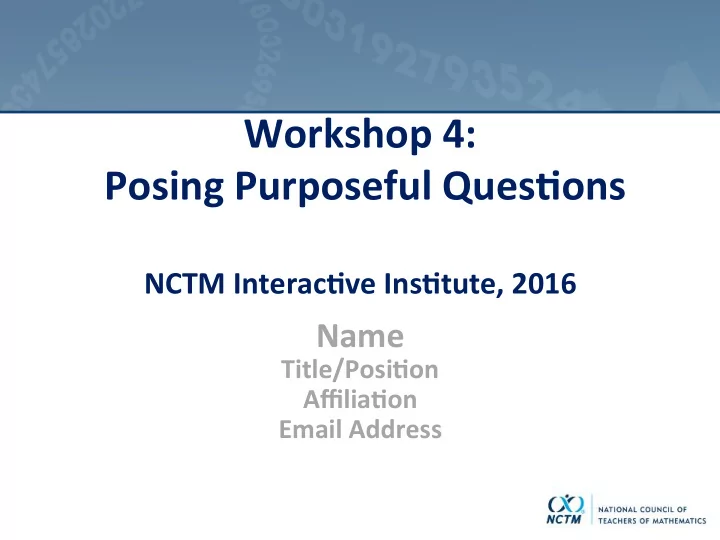

Workshop 4: Posing Purposeful Ques4ons NCTM Interac4ve Ins4tute, 2016 Name Title/Posi4on Affilia4on Email Address
Warm Up Make a 3 x 3 grid on your paper. Select 9 different numbers in the range –20 to 20. Arrange them in any order in your grid.
What type of ques4ons? When you think about the Bingo game, what types of quesFons were asked? What student understanding would be evident in the game? Talk in your group and describe the focus of the quesFons. 3
Ques4oning Techniques • Factual quesFons comprise the majority of quesFons asked in a mathemaFcs class – More than 145 quesFons in 48 minute class period – Less than 2 seconds for response Dougherty & Foegen, 2010 4
Moving from skill to concept Typical skill task: Simplify: 4(3 + 5 y ) 5
Change the Task Reversibility question: – Find an expression that can be simplified to 12 + 20 y . 6
Change the Task Generalization question: – Find an algebraic expression with 4 terms that can be simplified to one with 2 terms. What do you notice about the terms? – Find an algebraic expression with 3 terms that cannot be simplified. What do you notice about the terms? 7
Change the Task Flexibility question: – Write an equivalent expression to 3 b – 5. – Write another equivalent expression to 3 b – 5. 8
Change the Task Flexibility question Simplify: 5(4 x – 3) 5(4 a – 3) 5(4 y + 3) 5(3 + 4 y ) 9
Ques4ons to Promote Problem Solving and Generaliza4ons • Reversibility quesFons: – Promote the ability to think in different ways – Give the answer, students create the problem 10
Ques4ons to Promote Problem Solving and Generaliza4ons • GeneralizaFon quesFons: – Ask students to find and describe pa^erns – What pa^erns do you noFce? 11
Ques4ons to Promote Problem Solving and Generaliza4ons • Flexibility quesFons: – Ask students to solve a problem in mulFple ways OR to use what they know about one problem to solve another one – Solve the problem in another way – How are these soluFons alike? How are they different? 12
Your turn Select a lesson in your text. Write two reversibility, flexibility, and generalizaFon quesFons for the lesson. OR Write two reversibility, flexibility, and generalizaFon quesFons related to a problem set that is focused on problems such as: 13
Three types of ques4ons • Exploring: underlying mathemaFcal relaFonships and meanings • Probing: gecng students to explain their thinking • GeneraFng: moFvaFng discussion
What other types of ques4ons can be used? Use the descripFon of Ms. Quigley’s class. - Find different types of quesFons that she uses in her class. - What are the purposes of the quesFons? - What do they accomplish? (5 PracFces for OrchestraFng ProducFve MathemaFcs Discussions, [Smith & Stein, 2011], p. 64–67)
What types of ques4ons are used in your curriculum? • Look at your own curriculum. • What types of quesFons are suggested for you to use? • What could you add to the suggesFons? 16
Reflec4on ( Principles to Actions: Ensuring Mathematical Success for All [NCTM 2014], p. 41)
Disclaimer The National Council of Teachers of Mathematics is a public voice of mathematics education, providing vision, leadership, and professional development to support teachers in ensuring equitable mathematics learning of the highest quality for all students. NCTM ’ s Institutes, an official professional development offering of the National Council of Teachers of Mathematics, supports the improvement of pre-K-6 mathematics education by serving as a resource for teachers so as to provide more and better mathematics for all students. It is a forum for the exchange of mathematics ideas, activities, and pedagogical strategies, and for sharing and interpreting research. The Institutes presented by the Council present a variety of viewpoints. The views expressed or implied in the Institutes, unless otherwise noted, should not be interpreted as official positions of the Council. 18
19
Recommend
More recommend